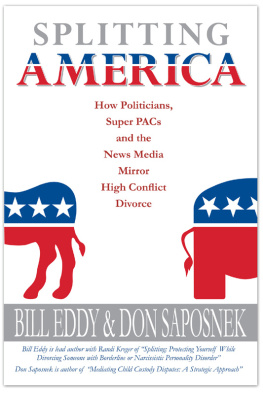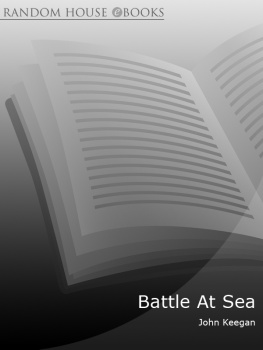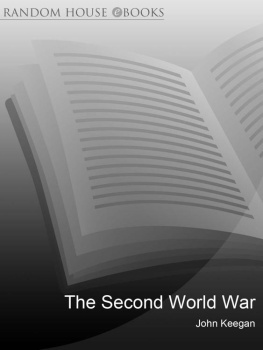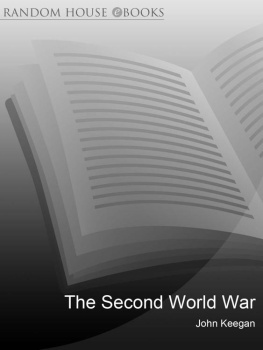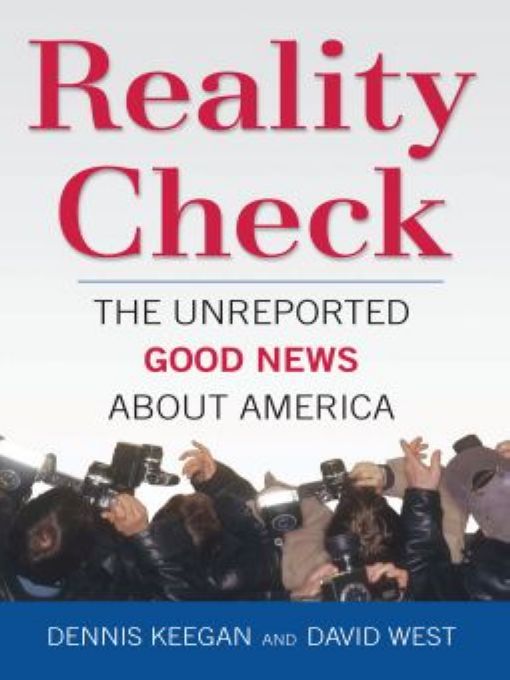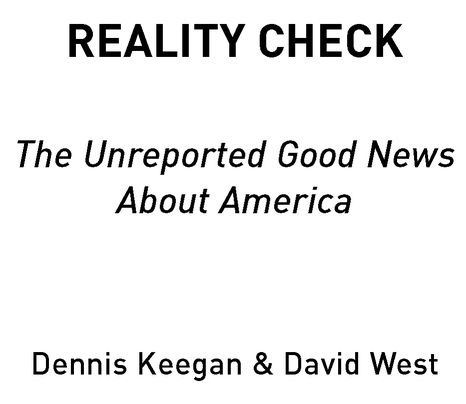Table of Contents
Facts are stubborn things; and whatever may be our wishes, our inclinations, or the dictates of our passion, they cannot alter the state of facts and evidence.
President John Adams
About the Authors
Dennis Keegan is Chairman and Chief Investment Officer of the Auspex Group, a hedge fund headquartered in Greenwich, Connecticut. Previously, he served for fifteen years with Salomon Brothers, Inc., in New York and London. During his career with Salomon Brothers he headed U.S. proprietary trading, European fixed income arbitrage, and foreign exchange. He was chairman of Salomons risk management committee, co-head of global fixed income, and co-chief executive of European operations. Mr. Keegan earned has bachelors degree in economics at UCLA, and an MBA from the Anderson School of Business at UCLA. He currently serves on the Anderson Schools Board of Visitors.
David W. West is Founder and CEO of Civicom, an advanced telecom and web-conferencing services company. He is former general manager of a division of Nestl, the worlds largest food company, where he championed a number of highly successful new businesses. He earned an MBA from Harvard Business School, where he also received a Making a Difference Award for his pioneering work in corporate philanthropy.
Introduction
PERCEPTION VERSUS REALITY
Any American who travels internationally gains a perspective of the United States that is often quite different from that provided by the prevailing news and politics back home. Returning from a third world country where the average income is less than $6,000 a year, with millions living on as little as $3.00 a day, where corruption and fraud are widespread, where unemployment is 8% or higher, where utilities and simple services we take for granted in this country dont work, and where health standards are low, you might find it hard to appreciate the constant blather about polls indicating how disappointed Americans are with the condition of the country. You might be a little less tolerant of the complaints of politicians and pundits about how broken our government is. While there are certainly things wed all like to improve, America is still the standard by which the rest of the world defines success.
If, while engaged in a conversation about the state of the country with a recent American college graduate, you said that huge tax cuts for the rich and outrageous spending on two wars was bankrupting the U.S. economy, he would probably agree with you. He has been told that the U.S. economy is a disaster for six years now. He believes the war in Iraq was justified solely by falsehoods and probably thinks the endeavor is doomed. He is convinced that American go it alone diplomacy has isolated the U.S. and increased the risk of nuclear disaster. Hes heard endlessly that FEMAs poor response to hurricane Katrina demonstrated the incompetence and the apathy of the U.S. government. In fact, you could say almost anything negative about the US and he would say, Right... tell me something I didnt know.
The problem is, not one of these notionswhich have in many circles become the generally accepted conventional wisdomis true. Since, as we all know, youre entitled to your own opinion, but not your own facts, this book is going to provide the ignored facts concerning these and other important issues where misconceptions exist.
We can not cover every important current issue, so weve chosen those where we felt the biggest gap exists between perception and reality. For example:
The economy has not been a disaster. In fact, Americas real growth rate over the past six years ranks near the top of developed nations.
Tax cuts and military spending have not caused unprecedented budget deficits. In fact, the deficit is lower as a percent of Gross Domestic Product (GDP) than it was during the 90s, 80s, and 70s. And defense spending has been lower as a percent of GDP than it was fifteen years ago when there were no major conflicts.
Tax cuts for the rich have not led to a huge increase in income disparity. In fact, the top income earners are paying a higher percentage of taxes today than ever before. Tax revenues are a higher percent of GDP than they were seven years ago.
The Bush administration hasnt had a failed go-it-alone foreign policy that endangered the U.S. In fact, U.S.-led coalitions in Iraq and Afghanistan were significantly larger than for the first Gulf War. Of the five nations that posed a nuclear threat when President Bush took office, three (Iraq, Libya, and Syria) have been eliminated and another (North Korea) appears to be on the verge of elimination, as a result of multilateral pressure and strength.
If you find these facts surprising, it means there really is a perception /reality gap on these important issues. There are many more to come in this book.
WHY SHOULD YOU CARE?
When falsehoods prevail, bad decisions follow. Its hard enough to make good decisions on complex issues even when starting out with solid information. But if you start with bad information and wrong decisions, unintended consequences will almost certainly be the result. One of the most successful business leaders of our time, Jack Welch, had a well publicized set of rules that guided his decisions. The first was:
Face reality as it is, not as you wish it were.
Jack Welch, former CEO of General Electric
This was Jacks most important rule because wishful thinking and selective perception can influence judgmentand affect decisionspowerfully. Most people tend to hear what is emotionally expedient. We gravitate toward what reinforces our belief system and, therefore, wont require the difficult task of rearranging memory chunks and thought patterns. If people consistently select only those sources of information that comfortably fit their biases, false conclusions and bad decisions naturally follow. When the future of a country is at stake, we of course all want to avoid bad decisions.
WHY THIS BOOK IS NEEDED: PART 1MEDIA CHAOS
Its no longer news to say that the mass media is undergoing a major transition. This book is not about the media, but it is worth reviewing the key events that have changed the character of the news we get from the media. They include:
1. TV news fragmentation elevated competition.
2. Increased amounts of unfiltered, unchecked information became available through the Internet.
3. Classified ad alternatives like eBay, AutoTrader.com, Monster.com and Craigslist took revenue from traditional media.
4. Two very close and contentious presidential elections increased partisan rhetoric.
5. A controversial war in Iraq raised the emotional vitriol.
One might have expected that the dramatic increase in the amount of information available and its frictionless transfer would have led to more reliable and accurate news. It seems the opposite has actually happened. Not too long ago, we had a choice of three monolithic evening news programs, run by editors and producers who made their best effort to adhere to conventional standards of journalistic ethicsreporting unbiased information. These three news machines and their print periodical counterparts were supported by armies of reporters and analysts who literally covered the globe.


